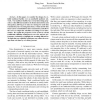Free Online Productivity Tools
i2Speak
i2Symbol
i2OCR
iTex2Img
iWeb2Print
iWeb2Shot
i2Type
iPdf2Split
iPdf2Merge
i2Bopomofo
i2Arabic
i2Style
i2Image
i2PDF
iLatex2Rtf
Sci2ools
103
click to vote
SRDS
2003
IEEE
2003
IEEE
Reliably Networking a Multicast Repository
Abstract— In this paper, we consider the design of a reliable multicast facility over an unreliable multicast network. Our multicast facility has several interesting properties: it has different numbers of clients interested in each data packet, allowing us to tune our strategy for each data transmission; has recurring data items, so that missed data items can be rescheduled for later transmission; and allows the server to adjust the scheduler according to loss information. We exploit the properties of our system to extend traditional reliability techniques for our case, and use performance evaluation to highlight the resulting differences. We find that our reliability techniques can reduce the average client wait time by over thirty percent.
Related Content
| Added | 05 Jul 2010 |
| Updated | 05 Jul 2010 |
| Type | Conference |
| Year | 2003 |
| Where | SRDS |
| Authors | Wang Lam, Hector Garcia-Molina |
Comments (0)

